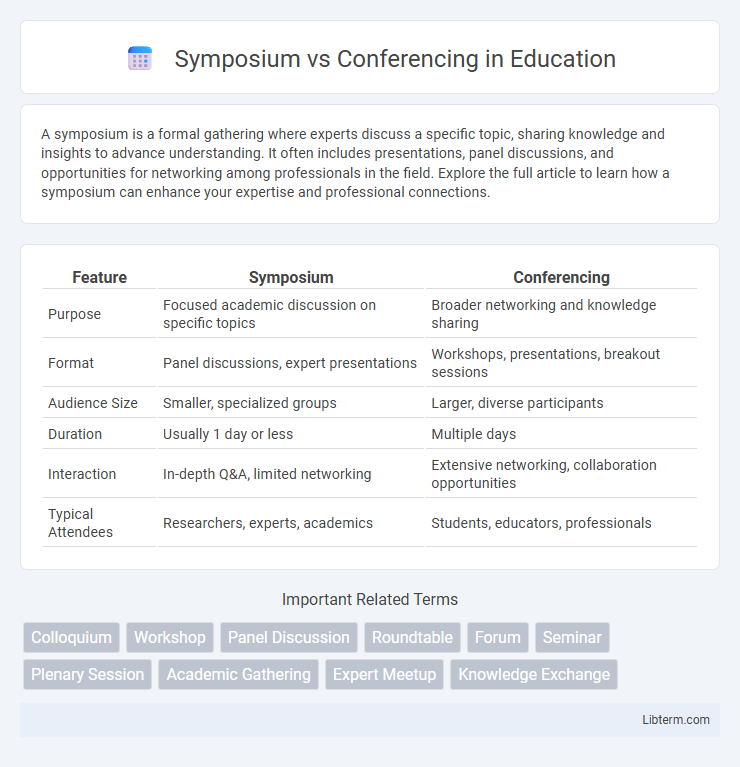A symposium is a formal gathering where experts discuss a specific topic, sharing knowledge and insights to advance understanding. It often includes presentations, panel discussions, and opportunities for networking among professionals in the field. Explore the full article to learn how a symposium can enhance your expertise and professional connections.
Table of Comparison
| Feature | Symposium | Conferencing |
|---|---|---|
| Purpose | Focused academic discussion on specific topics | Broader networking and knowledge sharing |
| Format | Panel discussions, expert presentations | Workshops, presentations, breakout sessions |
| Audience Size | Smaller, specialized groups | Larger, diverse participants |
| Duration | Usually 1 day or less | Multiple days |
| Interaction | In-depth Q&A, limited networking | Extensive networking, collaboration opportunities |
| Typical Attendees | Researchers, experts, academics | Students, educators, professionals |
Definition of Symposium
A symposium is a formal gathering where experts present and discuss specific topics, often involving detailed papers or presentations on a focused subject. It emphasizes in-depth academic or professional discourse, targeting knowledge exchange among specialists. Conferencing, by contrast, typically involves larger groups with broader agendas, aimed at networking, multiple sessions, and diverse discussion themes.
Definition of Conferencing
Conferencing refers to the organized event where participants engage in discussions, presentations, and networking, typically focusing on a specific professional or academic topic. It involves multiple sessions, keynote speeches, and panel discussions designed to facilitate knowledge exchange and collaboration among attendees. Unlike symposiums, which are often smaller and more specialized, conferencing can accommodate larger audiences and broader subject matter.
Key Objectives: Symposium vs Conferencing
Symposiums primarily focus on the in-depth exploration of a specific topic, encouraging expert presentations, critical discussions, and knowledge sharing within a specialized field. Conferencing aims to facilitate broader networking opportunities, collaboration across diverse disciplines, and the dissemination of research findings to a wider audience. Key objectives of symposiums emphasize subject-matter expertise and detailed analysis, while conferences prioritize interaction, community building, and professional development.
Structure and Format Differences
Symposiums typically follow a structured format where experts present research findings or specialized topics in a focused, often sequential manner, facilitating in-depth discussions. Conferencing encompasses a broader format, combining presentations, workshops, panel discussions, and networking sessions, allowing for dynamic interaction among a larger, more diverse audience. The structural difference lies in symposiums emphasizing concentrated thematic exploration, while conferences prioritize multi-faceted engagement and knowledge exchange across various subjects.
Typical Participants and Audience
Symposium participants typically include subject matter experts, researchers, and academics focused on presenting and discussing specialized topics within a narrow field, attracting an audience of scholars and professionals seeking in-depth knowledge. Conferencing gathers a broader spectrum of participants such as industry professionals, business leaders, and general attendees aiming for networking, knowledge exchange, and industry updates. The audience at conferences is often more diverse in background and expertise, reflecting a wide range of interests and professional goals.
Level of Interaction and Engagement
Symposiums typically offer higher levels of interaction and engagement through panel discussions, Q&A sessions, and collaborative workshops that encourage active participation among experts and attendees. Conferencing often features structured presentations and keynote speeches with limited direct interaction, focusing more on information dissemination to larger audiences. The immersive and interactive format of symposiums fosters deeper dialogue and networking opportunities compared to the more formal and passive conferencing environment.
Topics and Themes Covered
Symposiums typically focus on specialized, in-depth topics within a specific field, allowing experts to present detailed research and engage in focused discussions. Conferencing covers a broader range of themes, often incorporating multiple related disciplines and providing diverse perspectives through keynote speeches, panels, and workshops. The thematic scope of symposiums is narrower and more concentrated, whereas conferences offer a wider thematic variety designed to appeal to a larger audience.
Duration and Scheduling
Symposiums typically span one to two days, featuring a focused agenda with scheduled presentations and discussions on specialized topics. Conferencing events often extend over multiple days, sometimes a week or more, offering a broader range of sessions, workshops, and networking opportunities. The scheduling of symposiums is more compact and intensive, whereas conferences provide flexible time slots accommodating diverse participant interests and activities.
Advantages of Symposiums Over Conferences
Symposiums offer a more focused and interactive platform, allowing experts to delve deeply into specialized topics, fostering intense academic dialogue and collaboration. The smaller size of symposiums ensures higher engagement and personalized networking opportunities, enhancing the exchange of ideas and professional connections. This concentrated format often results in more actionable insights and a stronger sense of community among participants compared to broader, less focused conferences.
Choosing Between Symposium and Conference
Choosing between a symposium and a conference depends on the event's scope, audience, and objectives. A symposium typically centers on a specific topic with expert presentations and in-depth discussions, ideal for specialized knowledge exchange. Conferences offer broader themes, networking opportunities, and multiple sessions, suited for diverse audiences seeking comprehensive industry insights.
Symposium Infographic

 libterm.com
libterm.com